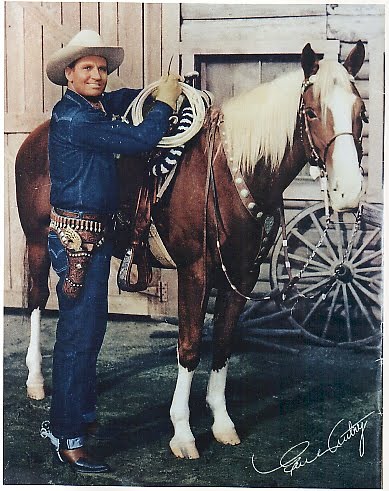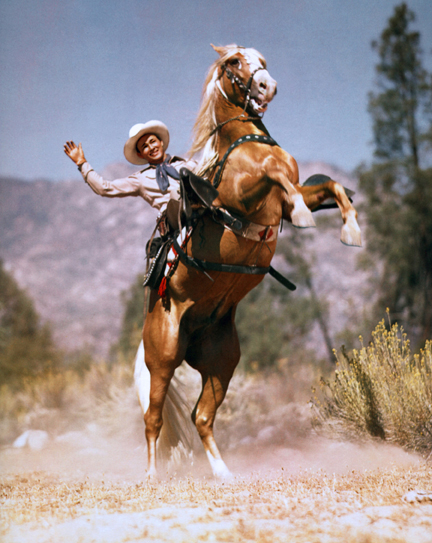The Movie Theater
It was not a large theater. It could probably not seat more than 200 people at the most but it was a special place. Going though the doors we come into a small lobby with a ticket window. The walls of the lobby are covered with colorful posters of movies that are coming in the near future.
In the 1950’s the theater was operated my Mr. and Mrs. Green. Their daughter, Pat, was in my school class.
We go up to the window and buy our ticket. The price for a child’s ticket was 16 cents. I don’t remember the amount ever changed from the first movie I saw there until the last one in the 1950’s.
We go up a couple of steps through some more doors. These take us into the theater itself. The floor slopes down slightly towards the screen that covers almost all of the far wall. There is an aisle that runs downs the center of the seating area dividing the audience into two parts. We notice that the viewers sit on benches, much more like church pews than individual seats.
I can’t remember but the theater must have been air-conditioned when that was a rarity. If it had not been, I think that it would have been so hot, with that many people, that it would have been intolerable. I don’t ever remember being uncomfortable there.
There was almost a religious ritual about the way we went to the movies. Every Saturday morning about 11 o’clock, a new western movie would begin playing at the theater. No one said they were going to the theater. They said simply “They were going to the Show”. We all had our different favorites, but as far as we were concerned, there was no such thing as a “bad cowboy movie.”

There was Gene Autry, Roy Rogers, Red Ryder and Little Beaver, Wild Bill Elliot, The Durango Kid, The Cisco Kid, Bob Steele, Hopalong Cassidy, Johny Mack Brown, Lash Larue, Whip Wilson, Jimmy Wakely and many more.
We always sat on the very front row on the left side. The only thing separating us from the big screen was a narrow stage that was sometimes used for live performances. Mostly, we looking almost straight up at the movie. We did not want to miss anything.

Usually, the sequence was the same. Almost always, the first thing that came on was what we called “The Previews”. These were short clips from movies that were going to come to the theater. A lot of these were boring to us kids - the romance and stuff. Next, I think, were the newsreels. Most of these were educational and helped keep the adults and children alike up to date on what was going on in the world. Some of it was real news and some of it was made up like in today’s National Enquirer. Before the advent of TV, the newsreels were how most folks got visual coverage of World War II.
After the newsreel, there was usually a cartoon. These were favorites with us kids. Many of these exact cartoons that were being shown in 1944 and 1945 can still be seen on modern TV.
Next, came what we called “The Continueds”. These were little serial stories, maybe 10 or 15 minutes long. They always ended with the hero or heroine in a serious predicament that seemed to have no solution. You would not know what happened until the next week when you came to the movie again to see the next chapter.
Finally, the main feature came on and they were enjoyed greatly. The audience was by no means quiet. They got into the movie, laughing at the jokes and cheering for the hero in the chases and fights.
In looking back at them, however, you are struck by how unrealistic they were and that no matter who was the star, there was only one plot. There were some certainties no matter who was playing in the movie.
The good guy actually did wear a white hat and the bad guy a black hat
A six shooter could actually shoot 20 or 30 times with out reloading
Almost nobody was ever killed. The good guy was never shot - “only grazed”
And so on
However, at the time, these movies were just great. Sometimes, if you really, really liked the movie, you sat through it twice before you went home.
Eventually, we became aware of other movies besides westerns. I remember first becoming aware of the Civil War and our Southern history when I first saw “Gone With The Wind” when I was about 10.
Over time, the movies at the theater were as important to teaching some of us about the world as our school classrooms - if not more.
I do not remember the exact date that the theater closed. In the 1950’s, it began to have serious competition from the various Drive-In movies that opened closeby - like the one on Pine Street. Also, more people had cars and went to the movies in Spartanburg. While it lasted, it provided a wonderful place of entertainment - and education- for Pacolet residents,
I doubt that today’s movie megaplexes with 3D, etc. can provide anymore enjoyment to a 10 year old boy than that movie theater in Pacolet Mills so many years ago.
This web site has been started as a public service to share the story of Pacolet.